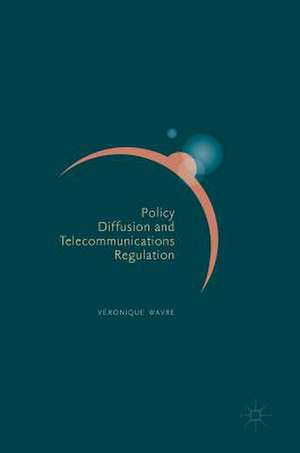Policy Diffusion and Telecommunications Regulation
Autor Véronique Wavreen Limba Engleză Hardback – 31 ian 2018
| Toate formatele și edițiile | Preț | Express |
|---|---|---|
| Paperback (1) | 716.11 lei 43-57 zile | |
| Springer International Publishing – 6 iun 2019 | 716.11 lei 43-57 zile | |
| Hardback (1) | 725.71 lei 43-57 zile | |
| Springer International Publishing – 31 ian 2018 | 725.71 lei 43-57 zile |
Preț: 725.71 lei
Preț vechi: 885.01 lei
-18% Nou
Puncte Express: 1089
Preț estimativ în valută:
138.87€ • 145.35$ • 115.58£
138.87€ • 145.35$ • 115.58£
Carte tipărită la comandă
Livrare economică 31 martie-14 aprilie
Preluare comenzi: 021 569.72.76
Specificații
ISBN-13: 9783319707440
ISBN-10: 3319707442
Pagini: 193
Ilustrații: XVII, 202 p. 2 illus.
Dimensiuni: 148 x 210 mm
Greutate: 0.54 kg
Ediția:1st ed. 2018
Editura: Springer International Publishing
Colecția Palgrave Macmillan
Locul publicării:Cham, Switzerland
ISBN-10: 3319707442
Pagini: 193
Ilustrații: XVII, 202 p. 2 illus.
Dimensiuni: 148 x 210 mm
Greutate: 0.54 kg
Ediția:1st ed. 2018
Editura: Springer International Publishing
Colecția Palgrave Macmillan
Locul publicării:Cham, Switzerland
Cuprins
Chapter 1: Introduction.- Chapter 2: Conditions and mechanisms of policy diffusion.- Chapter 3: Measuring policy diffusion.- Chapter 4: Country and sector cases selection.- Chapter 5: Regulatory actors in MENA telecommunications.- Chapter 6: Egypt.- Chapter 7: Morocco.- Chapter 8: Jordan.- Chapter 9: Observation and Conditions of diffusion in comparative perspective.- Chapter 10: Mechanisms of diffusion and telecommunications trends.- Chapter 11: Conclusion.
Recenzii
“Veronique Wavre’s book Policy Diffusion and Telecommunicatons Regulation could be useful for a Nordic reader. … the book would improve your understanding of the Arab Spring, a series of uprisings in MENA countries in 2011. … the most innovative part of the entire study is the method based on state-level and sector-level variables, which the author successfully uses for analysing policy adoption in these specific countries as well as for comparing them to each other.” (Marko Ala-Fossi, Nordicom Review, Vol. 40 (1), 2019)
“It is an innovative book, in that it brings together different themes that are usually treated separately, for belonging to different strands of the literature. The outcome is an original monograph that is of interest to students of policy diffusion, telecommunications regulation, European Neighbourhood Policy (ENP) and MENA countries. … Wavre produced an excellent and original monograph that I recommend to anyone interested in policy analysis in MENA countries, EU Neighbourhood Policy and regulation in developing countries.” (Emmanuelle Mathieu, Swiss Political Science Review, Vol. 25 (1), 2019)Notă biografică
Véronique Wavre is a Post-Doctoral Fellow at the School of Economics and Politics (SEPS), University of St. Gallen, Switzerland. She previously worked at the College of Social Sciences and International Studies (SSIS), University of Exeter, UK. She researches telecommunications policies and state control in the Middle East and Africa.
Textul de pe ultima copertă
This study investigates regulatory reforms in the telecommunications sector of Middle Eastern and North African (MENA) countries. It explores telecommunications innovations in three developing economies (Morocco, Jordan and Egypt), with a focus on regional and European trends in telecommunications policies. Common knowledge suggests that the European Union and its member states are the main influential regulatory power in the MENA region. However, the empirical analysis of selected telecommunications regulations: universal service obligation (USO) and spectrum management, reveals that reforms are not always determined by European countries but may also originate from other developing countries, such as Peru and Chile. This finding attests to the rise of regulatory influence from the Global South, which challenges traditional transfers of regulations originating from more industrially advanced countries.
Véronique Wavre is a Post-Doctoral Fellow at the School of Economics and Politics (SEPS), University of St. Gallen, Switzerland. She previously worked at the College of Social Sciences and International Studies (SSIS), University of Exeter, UK. She researches telecommunications policies and state control in the Middle East and Africa.
Caracteristici
Disentangles the major actors in the telecommunications sector and identifies their potentially conflicting economic and political interests Uncovers governmental strategies of policy-making in the telecommunications sector, including decisions of regional governments to develop policies Examines changes in regional trends and specifically the rise of Southern countries as regulatory weights in the telecommunications sector
